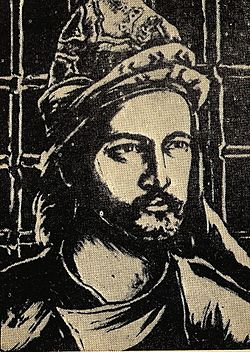Sohrevardi
| Sohrevardi | |||
|---|---|---|---|
 | |||
| Født | 1155 Sohrevard (Iran, Abbasidene) | ||
| Død | 1191[1] Aleppo (Syria, Abbasidene) | ||
| Beskjeftigelse | Filosof, skribent, lyriker | ||
| Nasjonalitet | Abbasidene | ||
«Shahāb ad-Dīn» Yahya ibn Habash as-Suhrawardī (født 1155, død 1191), også kjent som Sohrevardi, var en persisk[2][3][4][5][6][7][8][9] muslimsk filosof og en sufi fra Zanjan. Han var inspirert av zoroastisk filosofi og nyplatonisme.
Referanser[rediger | rediger kilde]
- ^ Autorités BnF, data.bnf.fr, besøkt 10. oktober 2015[Hentet fra Wikidata]
- ^ Ziai, H.(1997), “Al-Suhrawardi”, Encyclopaedia of Islam, New Ed., vol. 9: 782-784. Quote: "AL-SUHRAWARDI, SHIHAB AL-DIN YAHYA b. Habash b. Amirak, Abu'1-Futuh, well known Persian innovative philosopher-scientist, and founder of an independent, non-Aristotelian philosophical school named the "Philosophy of Illumination" (Ḥikmat al-ʿishraq)"
- ^ C. E. Butterworth, M. Mahdi, The Political Aspects of Islamic Philosophy, Harvard CMES Publishers, 406 pp., 1992, ISBN 0-932885-07-1 (see p.336)
- ^ John Walbridge, “The leaven of the ancients: Suhrawardī and the heritage of the Greeks Arkivert 12. mars 2016 hos Wayback Machine.”, State University of New York Press, 1999. Excerpt: “Suhrawardi, a 12th-century Persian philosopher, was a key figure in the transition of Islamic thought from the neo-Aristotelianism of Avicenna to the mystically oriented philosophy of later centuries.”
- ^ Seyyed Hossein Nasr, “The need for a sacred science”, SUNY Press, 1993. Pg 158: “Persian philosopher Suhrawardi refers in fact to this land as na-kuja abad, which in Persian means literally utopia, "no-place.”
- ^ Matthew Kapstein, University of Chicago Press, 2004, "The presence of light: divine radiance and religious experience", University of Chicago Press, 2004. pg 285: "the light of lights in the system of the Persian philosopher Suhrawardi"
- ^ Hossein Ziai. Illuminationism or Illuminationist philosophy, first introduced in the 12th century as a complete, reconstructed system distinct both from the Peripatetic philosophy of Avicenna and from theological philosophy. in: Encyclopædia Iranica, Volumes XII & XIII. 2004.
- ^ Edward Craig, Routledge Encyclopedia of Philosophy, "al-Suhrawardi, Shihab al-Din Yahya (1154-91)" Routledge 1998. Excerpt: "Shihab al-Din Yahya ibn Habash ibn Amirak Abu’l-Futuh al-Suhrawardi, known as al-Maqtul (the Slain One) in reference to his execution, and usually referred to as Shaykh al-Ishraq after his school of Illuminationist philosophy (hikmat al-ishraq), was born in AH 549/AD 1154 in the village of Suhraward in northwestern Iran."
- ^ Donald M. Borchert, Encyclopedia of Philosophy, Vol. 9 Gale / Cengage Learning 2nd. Edition, 2006. "suhraward ̄i, [addendum] (1155 or 1156–1191)" Excerpt: "Shihab al-Din Suhrawardi is one of the best known, innovative, yet controversial Persian philosophers in the history of philosophy in Iran."
Denne artikkelen er en spire. Du kan hjelpe Wikipedia ved å utvide den.
